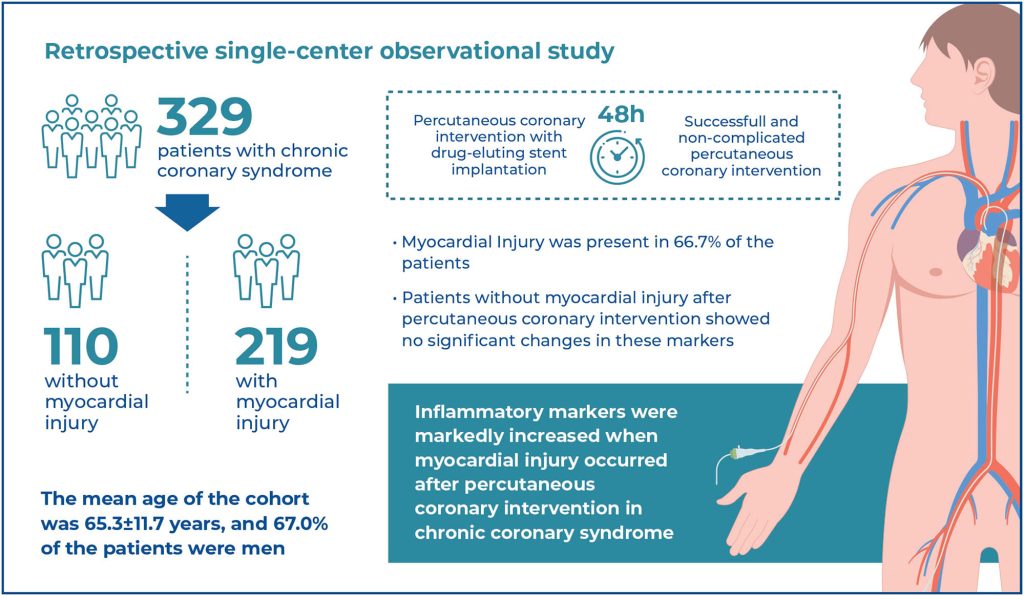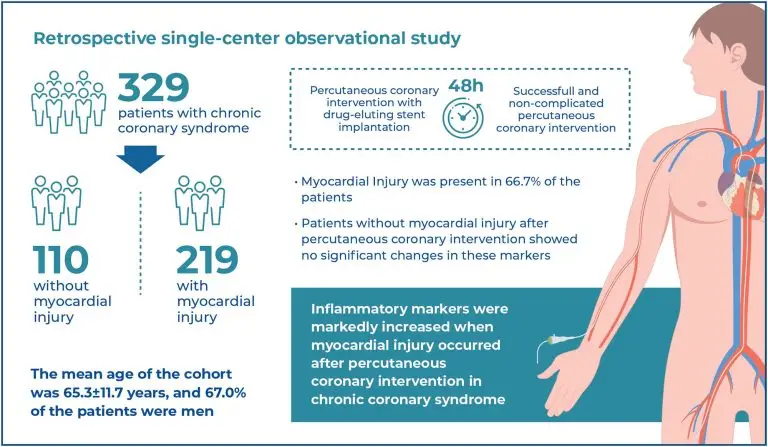einstein (São Paulo). 12/set/2025;23:eAO1582.
Inflammatory response to elective percutaneous coronary intervention is related to myocardial injury
DOI: 10.31744/einstein_journal/2025AO1582
Highlights
■ Previous studies have correlated inflammation with complications after percutaneous coronary intervention.
■ In patients with stable coronary disease, percutaneous coronary intervention leads to elevated inflammatory biomarker levels.
■ The inflammatory response is significantly correlated with myocardial injury.
ABSTRACT
Introduction:
In acute coronary syndrome, the release of inflammatory and myocardial injury biomarkers after percutaneous coronary intervention is associated with poor prognosis. However, little is known about the association between these biomarkers in patients with stable disease.
Objective:
We aimed to analyze the association between the systemic inflammatory response and myocardial injury after percutaneous coronary intervention in patients with chronic coronary syndrome.
Methods:
In this retrospective observational study, we collected blood sample data from 329 patients with chronic coronary syndrome before and 48 hours after successful percutaneous coronary intervention. Inflammatory biomarkers, including high-sensitivity C-reactive protein (CRP), white blood cells and subtypes, platelets, mean platelet volume, neutrophil-to-lymphocyte ratio, and platelet-to-lymphocyte ratio, were determined. High-sensitivity cardiac troponin I (hs-cTnI) was measured within 48 hours after percutaneous coronary intervention. Procedural myocardial injury was defined as an increase in hs-cTnI level without any new electrocardiographic changes or flow-limiting complications.
Results:
Percutaneous coronary intervention induced a systemic inflammatory response, with elevated levels of inflammatory biomarkers. Myocardial injury was detected in 66.7% of the patients. Spearman’s rank-order correlation revealed an association between hs-cTnI and increased inflammatory biomarker levels: CRP 0.570 (p<0.001), neutrophil-to-lymphocyte ratio 0.190 (p<0.001), mean platelet volume 0.182 (p<0.001), platelet-to-lymphocyte ratio 0.180 (p<0.001), white blood cells 0.166 (p<0.001), neutrophils 0.145 (p<0.001), eosinophils 0.142 (p<0.001), lymphocytes −0.130 (p<0.001), monocytes 0.031 (p=0.344), and platelets −0.009 (p=0.778).
Conclusion:
Percutaneous coronary intervention in patients with chronic coronary syndrome induces a systemic inflammatory reaction, which is associated with myocardial injury.
[…]
74



